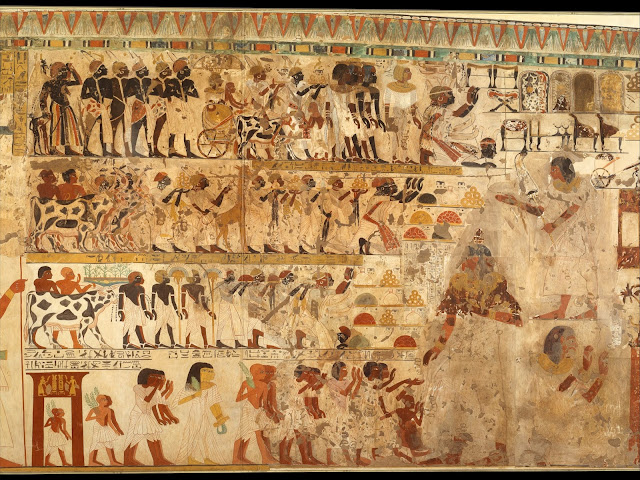The Moral values and The social life in ancient Egypt
The Moral values and The social life in ancient Egypt
In this early era for
the oldest human group whose news reached us, it was previously thought that
the right of every individual to have good morals can be based on the basic of
the approach and behavior which by it treat with members of his family, and
they are his father, mother, brothers, and sisters.
And one of the nobility
men of Upper Egypt who lived in the twenty-seventh century BC was confirmed
this to us, as he said in the inscriptions of his tomb after enumerated to us
many of his good deeds: "I do not tell a lie, because I was a human
loved by his father, praised by his mother, good behavior with his brother,
friendly to his sister."
We also find, after a
period from the date of this inscription, that one of the king's confidants from the people of Upper Egypt also confirms:
" The king has
praised me, and my father left a will for my benefit because I was kind... and
a human loved by his father, praised by his mother, and all his siblings loving
him ", and we
often see the nobility during the Age of the Pyramids collecting their good
qualities in the following phrase: " I was a human loved by his father,
praised by his mother, and loved by his brothers and sisters ."
The
righteousness to Parents was one of the most prominent important virtues in the Age of the Pyramids,
as we find is mentioned in ancient inscriptions over and over again in the
cemeteries of pyramids, that the righteous sons had made these huge tombs for
their deceased fathers, and the son was preparing his father a luxurious burial
ground, and one of the sons of that era mentioned in the inscriptions of his
tomb: "And now I have worked to be buried in the same tomb with “Zau”
(his father) to be with him in one place, and this didn't mean that I am not in
status allows me to build a second tomb, but I did so that I could see this
"Zau" every day, and to be with him in the same place".
We
have also another case greater than this in the righteousness of the son to his
father, which is the story of "Sebni" (the guard of the southern
door), that is, the keeper of the Egyptian border from the side of
"Sudan" at the first waterfall of the Nile, it happened "Mekhu"
father Of " Sebni " had made a dangerous trip in the heart of
"Sudan" for trading, and there some savages swooped on him and
slaughtered him, When his son " Sebni " heard about the slaying
of his father, he immediately made a dangerous journey in the heart of that
hostile territory, and he saved his father's body after exposed his life to
death, and brought the body of his father to be preserved in Egypt, and still
the tomb of " Sebni " remaining in "Aswan" until now,
and this tomb contains inscriptions indicating what the son " Sebni"
did towards his father " Mekhu" of the courage to save the body of
his father from the hands of those enemies in the ancient Age of the Pyramids.
The social life in ancient
Egypt
These
inscriptions that we see on the tombs of "Memphis" represent the
period about 500 years time span, that is from 3000 BC to 2500 BC, and it
considers the first manifestation of the family life which remained to us from
the ancient world, and these drawings are artistic relics and sources from
which we draw our information about the lives of the ancient Egyptians in
agriculture, herding, and industry, and about their social life, and the
cheerful social relations involving friendliness, it considers a new discovery
to be of fundamental importance in the history of morality.
In
those engraved inscriptions, we see the owner of one of the villages that
surround the city of "Memphis" engraved on the wall by a great size
and supervises the men of his village who engraved with him in the image with a
much smaller size, we see him check on them as they sowing grain or harvesting
the crops or herding livestock and flocks, or digging the irrigation canals, or
work in building their boats, their
trade shops, factories of making copper, or the place of pottery making, and other
hundreds of images that tell us about many aspects of their activities and
works in their worldly life.
And
you also see in these inscriptions the ancient Egyptian noble accompany his
wife with him in all those spacious tours throughout his vast village, and in
fact, his wife was sharing with him all his life and all his works and their
children were always with them.
We
also, see the head of household fishing in the swamps which designated for that
purpose, and his wife and child beside him, and all of them in a reed boat
swimming among the long papyrus flowers, and in this image, the child was
curved towards the water to picking the Water Iris flowers, and we also see the
Egyptian Noble sitting in his garden, and his children in front of him playing ball
or playing in a pond of the garden during they were fishing.
Accordingly,
it becomes clear that moral values were appreciated in the eyes of the gods,
which may materially affect the happiness of the deceased in the afterlife.












No comments